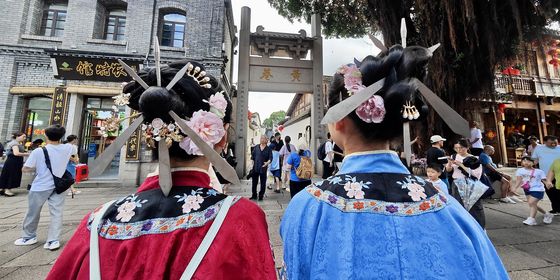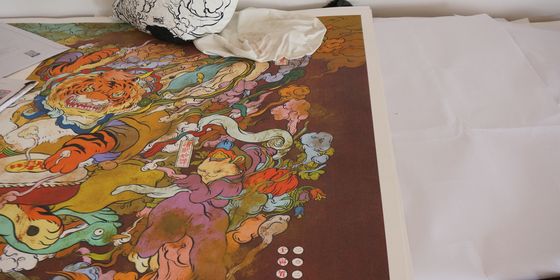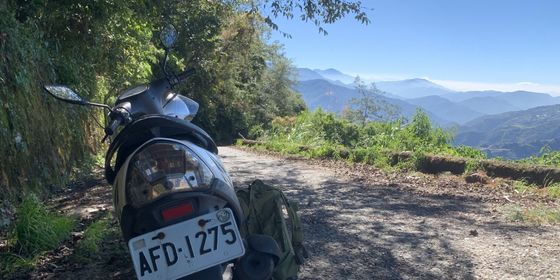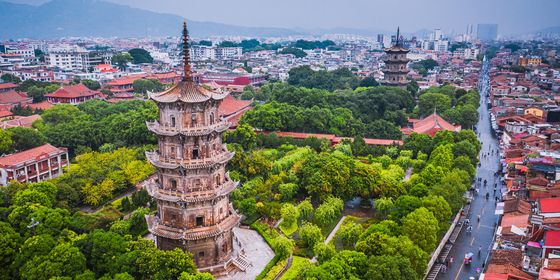Fujian’s Pingtan Island offers a gateway to Taiwan and a fragile maritime charm
I felt like an arrow shot into oblivion, not sure where I would land. As late afternoon turned to evening, I decided to put my faith in the taxi driver while the darkness closed in, trusting in his instincts as a local to guide us down coastal country lanes and past dimly lit stone farmhouses perched above the sea.
Why was I thousands of kilometers away from my home in Beijing, speeding down the coast of a small island in the Taiwan Strait? I was spending a few days in Pingtan (平潭) county, an archipelago in Fujian province which runs daily ferries to Taichung and Taipei. I had been interested in visiting Taiwan ever since learning about how the Kuomintang fled to the island at the end of China’s civil war in 1949, and decided to travel by boat instead of flying in order to reduce my carbon footprint—as well as give myself time to get lost, find my way again with the help of strangers, and savor every moment of the slow journey.
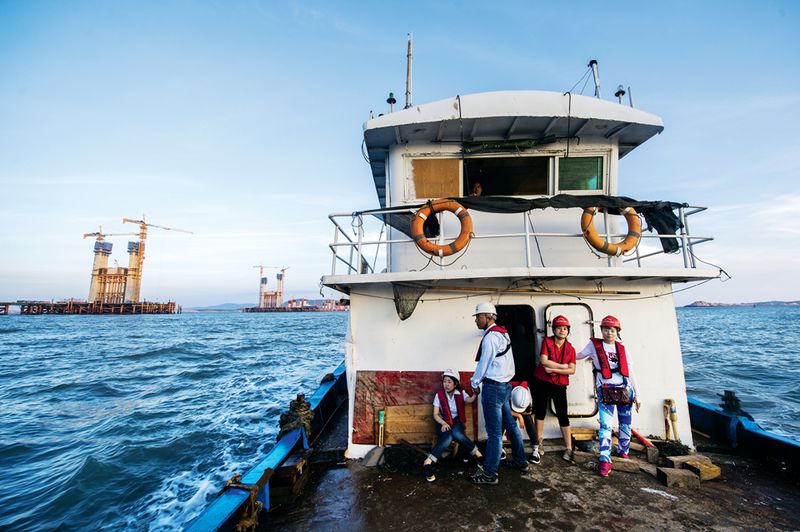
Workers take a boat to the Pingtan Strait Bridge construction site
After a circuitous route by train and bus via Shanghai, Fuzhou, and the city of Fuqing, which is connected by a bridge to Pingtan’s main island, I arrived in Pingtan a week after my departure, exhausted, and thankful to spend my first night resting in a farmhouse, where the garden trees were strung with fairy lights. The surrounding community, Mojing, was a sleepy village with a strong sense of seafaring about it. Gray, weatherbeaten cottages huddled together on a peninsula overlooking the East China Sea, as if protecting each other from exposure to the brutal sea winds.
The adventures, though, were not over: I still had to get my ferry ticket, which could only be bought in person at the travel agency in Pingtan’s town center with a passport. The next morning, I took up the insistent offer of Yan, the guesthouse’s Taiwanese manager, to take me to town for the tickets. We set off on her electric scooter on Pingtan’s 200-kilometer coastal road, which winds across the entire island on sunny bluffs overlooking the surf below, occasionally passing boulders sculpted into strange shapes by erosion.
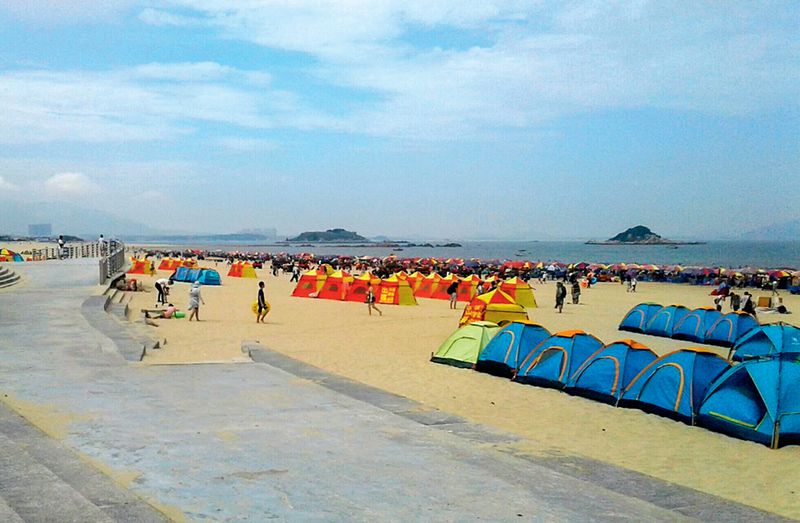
Pingtan attracts tourists from both sides of the Taiwan Strait
With an area of 370 square kilometers, Pingtan’s main island, known also as Pingtan or Haitan (海坛), is the largest island in Fujian province and the fifth largest in China. It’s also the nearest point between the Chinese mainland and the island of Taiwan, at just 68 nautical miles. Beyond this, though, there aren’t many conventional attractions for the island to boast of—no famous battles nor exiles ever reached its shores in thousands of years of history, nor has it been the subject of any poems. Before China was unified under the Qin dynasty, an ancient atlas referred to this area as the domain of the “Hundred Yue” (百越) tribes who “intermixed freely and practiced assorted customs,” implying that the people of the central empire didn’t consider them important enough to keep track of their names.
Pingtan continued to be peripheral until the 10th century, when the Min kingdom set up its capital in nearby Fuzhou during a period of disunity. In the 1950s, when cross-straits relations were at their most explosive, the island was a strategic military outpost where locals were enlisted to dig tunnels and bunkers, but it has since faded back into obscurity. The community remains sparsely settled today—with just 400,000 residents, who mostly engage in fishing, forestry, and farming peanuts and sweet potatoes.
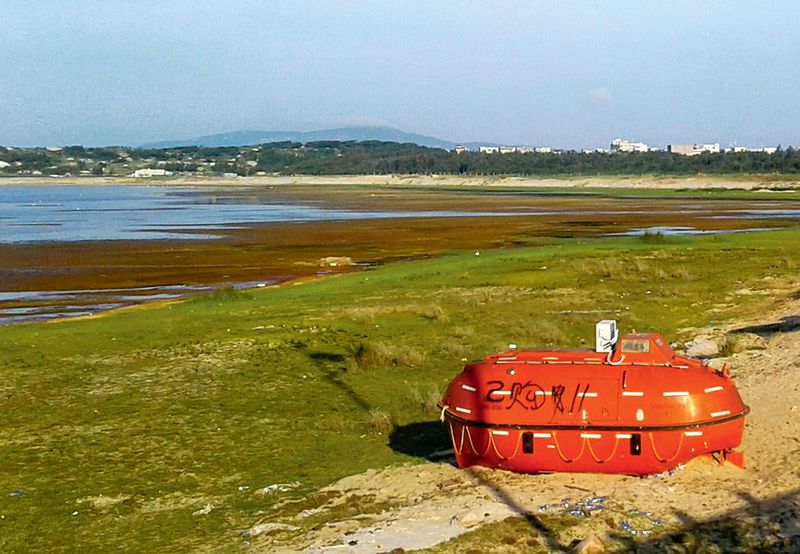
A lifeboat appears to be abandoned on the sand
In recent years, Pingtan has come to host over 3 million tourists each year, drawn by the islands’ rustic “stone villages,” colorful sunsets, and picturesque cliffs. The entire island has been declared an “experimental economic zone,” with industrial parks set aside for cross-straits economic and cultural exchanges. In 2016, China’s State Council named the sleepy archipelago an “international tourism island,” a title it shares with swanky Hainan to the south. Large areas of the coast have undergone land reclamation, and the world’s longest rail-and-automobile bridge, a staggering 16-kilometer span connecting Pingtan Island to Fuzhou via several islets in the Haitan Strait, is due to open to traffic in 2020.
As a result of this frantic development, Pingtan’s downtown doesn’t look much different from any other county-level town in China today, except maybe with more construction. Nature continues to be the island’s real draw: Thirty-Six Feet Lake, Fujian’s biggest freshwater lake and alleged home of a dragon; boulders with descriptive names like “Half-Ocean Sails” and “Five Fingers of the Immortal”; and of course, miles of beaches below fishing villages or hidden behind seaside coves. The next day, Yan agreed to take me to Da’ao Beach, a supposedly little-known attraction close to her village.
We zoomed on Yan’s scooter across the coastal highway, and headed down a small secluded lane. A wall by the side of the road, seemingly made of randomly stacked rocks, opened up to a multicolored barn. Pingtan is dotted with such structures, forming “stone villages” with rustic homes built out of slabs of colorful, locally found granite, and roofs tiled with smooth pebbles that resemble fish scales from a distance. These stone houses are ideal for withstanding the strong winds on the island, allowing fishing families to stay safe and cozy on a stormy night or cool under the midday sun—not to mention, adding considerably to the island’s nautical charm.
As we drove down toward the beach, though, my heart also began to drop like granite: old sofas and decaying washing machines appeared by the roadside, a stark contrast to the idyllic farm just around the previous bend. Burnt tires and huge chunks of polystyrene soon joined nature’s convenient dumping ground, likely the result of rising consumerism and throwaway lifestyles that even this remote outpost isn’t immune to. The beach itself also seemed like a magnet for unwanted things, including a large cargo ship that sat on the sand like a retired sailor. It had been slowly rusting there for seven years, according to Yan.

An art installation made by the author using trash on the beach
Pingtan’s beaches were once a famous “Shipwreck Dock,” the final resting place of many wrecked wooden war vessels that once upon a time protected the local fishermen from pirates and vagrants. Our particular wreck, though, was a modern “bulk carrier” vessel used to ferry loose cargo such as grains and coal. Dozens of such boats litter Pingtan’s beaches, decommissioned after a long life of service and sent ashore to await dismantling, a massively costly effort that is not considered a priority by the shipping industry. Even Yan seemed a little embarrassed to have brought me here.
Returning to the guesthouse, we found many elderly neighbors chattering in the yard, where they gather each day to cook together and socialize. Not surprisingly, Pingtan’s cuisine is dominated by seafood and sweet potatoes, including steamed crab, and two evocative local snacks called shilai yunzhuan (“luck finally turns in one’s favor”), steamed buns made from sweet potato flour, and tianchang dijiu (“enduring as long as the sky and earth”), fried sweet potato dumplings. I watched as the elders dished up razor clam with spicy salt fish balls, oyster cake and abalone chop soup, and lastly, sweet glutinous rice wrapped in banana tree leaves.
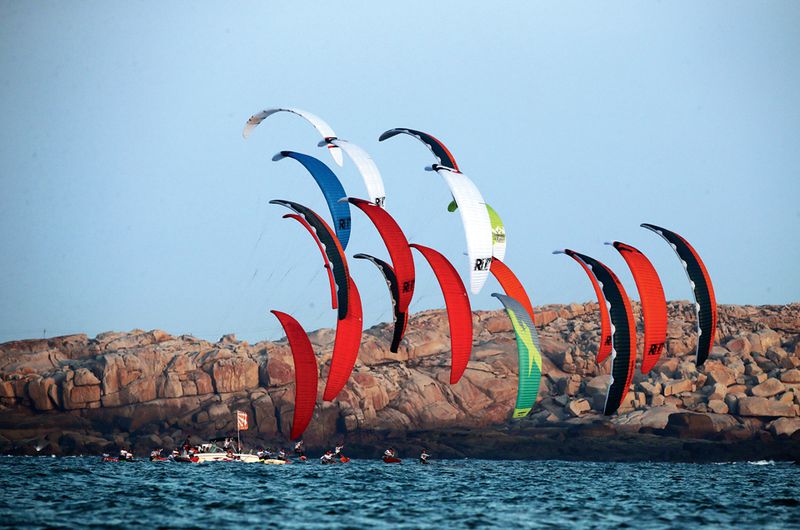
Windy conditions near Pingtan’s coast attract many kite-surfers
Economic development on the island has touched even its villages, where some stone cottages have been refurbished into multi-story guesthouses like Yan’s, many of them also run by young Taiwanese migrants. Other fishing families offer a bed and seafood feast to paying guests during the high season, when laws require them to put away their nets to protect the marine life. But as I watched the other guests order lunch using delivery apps, which also now operate on the island, I was reminded again of the tons of rubbish on the beach. Feeling a sense of hopelessness, as well as a strong desire to do something, I headed back to the beach.
I decided to create art using the objects on the sands. Even if it was impossible to make a real difference in the few days I was there, maybe a work of art would open people’s eyes to the potential to reuse things that they would normally throw away, or at least get them to take another look at their environment. Picking my way through the discarded shoes, pieces of Styrofoam, lengths of wood, glass bottles, and plastic containers left by merry holidaymakers, I found two pieces of foam that inspired me. They were all rounded, with corners worn away by the tides, and surfaces mottled brown by the elements, as if they had already started returning to nature.
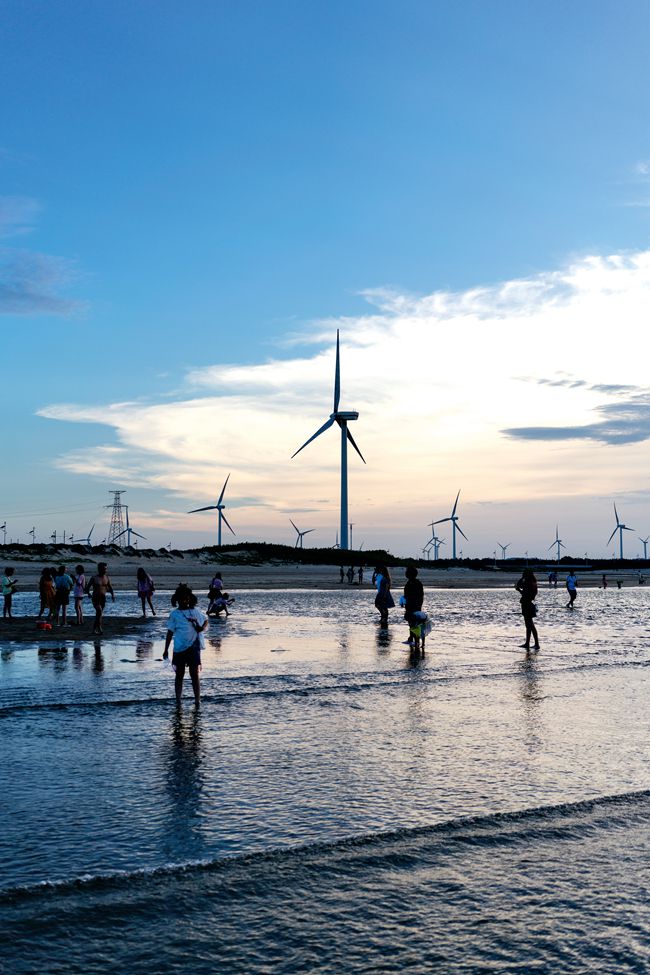
A wind farm lies adjacent to one of Pingtan’s primary beaches
I picked up wooden sticks and started to build, trying different ways of inserting them into the foam, already resolving to do so without glue. I wanted to make something simple and immediate, that would stand out, and show that it was possible to leave more than useless trash on that beach. Eventually, I built two sculptures and placed them high up on the dunes, and left them there standing like strange, spiky trees, looking almost organic.
I spent my final day in Pingtan at Changjiang’ao Beach, one of the main tourist destinations on the island. The sun hung low in the late afternoon sky, glistening across the wet sand while crowds of holidaymakers strolled along the beach and splashed in the surf, and hermit crabs scurried frantically underfoot. Hermit crabs are natural recyclers, as they burrow in old shells, rocks, pieces of wood, and any other random objects in which they can fit their soft and vulnerable body. I chased and successfully caught one of the speedy crabs, then let it go on its merry way, realizing that nature held the perfect answer for how to reuse and reduce waste all along.
Raising my eyes to the horizon, I saw the turbines of a wind farm that adjoins the beach. With wind speeds reaching up to 8.4 meters per second, Pingtan had long been a destination for kite-surfing and other wind sports—it even hosts an international kite-surfing competition each year—and it was pleasing to see this resource being harnessed for renewable energy. It seemed like a hopeful note on which to end my stay.
I caught my ferry for Taichung the next morning, mentally bracing myself for the three-hour crossing with a typhoon forecasted to arrive from Japan. All was calm, though, as we pulled away from the dock. As the sea began to roll mildly beneath us, I pictured the wind turbines on the island being stirred to life by the breeze, and my own sculptures swaying on their beach. I hoped that in the years to come, by protecting its natural and cultural environment, Pingtan can continue to be a beautiful and hospitable stopping place for passersby like myself, and all the other flotsam and jetsam that wash upon its shores.
Waves of Change is a story from our issue, “Contagion.” To read the entire issue, become a subscriber and receive the full magazine.







